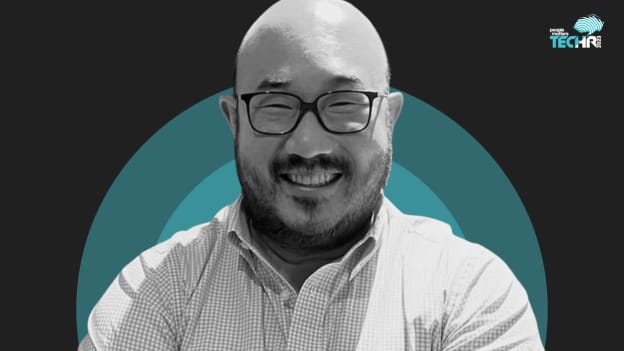Listen to your employees and adapt to their needs or lose the war for talent: Michael Kim, Spotify

He says it as it is and doesn’t believe in mincing his words. That’s why Michael Kim, Spotify’s Head of HR JAPAC & SAMEA is one of the few HR leaders to make it to the White House to meet the President and Vice President of the United States in 2015 for the relaunch of the Parental Leave Program - an initiative that has been known to create psychological safety without hurting career growth opportunities. At Spotify, one of the few companies that has shown us the way to the ‘art of the possible’ by disrupting the way we consumed music for so long, each of their leaders lead by example, and today, their people initiatives have put them on the world map, with many firms embodying them.
But Michael personally believes that HR teams need to create new playbooks that work for their specific organisational goals, values, and culture. For him, the new decade of HR will be dictated by this simple truth: The days of mirroring playbooks from other companies and calling them your own or copy-pasting traditional and outdated HR methodologies will no longer be the norm.
As we gear up to design for the unconventional at People Matters TechHR Singapore 2023, where Michael will be a keynote speaker, we sat with him to learn more about Spotify’s philosophy, which has been instrumental in creating some of the globally recognised HR programs and the excitement of working at a company that encourages innovation, collaboration, sincerity, playfulness and passion at every turn.
Through this interview, you will get to know why HR leaders at Spotify truly believe in listening to their people, and why it’s necessary for their people to feel a sense of accomplishment through their work and not their titles. We will also decode the debate around return to office (RTO), a mandate where organisation’s actions tend to be contradictory to their values.
Excerpts from the interview:
With the ethos of what’s best for your people, you have designed Family-Friendly Benefits, Parental Leave, Welcome Back, Flexible Public Holiday, Work From Anywhere programs, among others. What were the factors that contributed to the success of your programs? Any learnings you would like to share?
I think the first factor that contributed to the success of these programs is that Spotify is truly a people first company, validated by our culture and values. We have proven time and again when making decisions, that we take a people-first approach. I believe that this has formed the foundation of trust between HR and our people, and they trust that any program we roll out is meant for their best interest and benefit.
Another key factor towards the success of these programs is that our leaders have led by example when it comes to promoting these unique benefits we have. Our parental leave program is a great example. When we first launched our revamped parental leave program years ago, and said that all employees regardless of being a mother or a father can take six months fully paid leave, we were met with a bit of scepticism at first, especially from our Spotify dads. But when our senior leadership team not only encouraged our employees to take full advantage of the six months off, but also a lot of our own leaders took their own parental leave as well, it created a sense of psychological safety that anyone can take the time off without fear of retaliation or hurting their career growth opportunities at Spotify.
Leading by example is a powerful tool to build trust and credibility with your employees. Actions always speak louder than words.
For a lot of organisations, adapting to and meeting employee expectations may seem like a groundbreaking and lengthy process, but you have achieved that with simplicity and ease in your people initiatives. How do you think the next decade will be for HR and the world of work? What will you be doing differently to stay ahead of the curve?
I am happy to hear that from your perspective, it looks like we achieved this with simplicity and ease! But from Spotify’s perspective, this has been an ongoing journey for us that never ends. I think we were able to crack the code because we take the time to truly listen to our people. And we take the voice of our people and convert it into data that drives our decision-making process when thinking about new initiatives and projects we want to focus on.
I think that is the next decade for HR in this new world of work. To take the tools and resources you have as an HR organisation and tweak them to the unique needs of your people and make it resonate with your unique culture. It is critical now more than ever to make sure your people feel supported and heard. Cookie-cutter initiatives or creating programs that do not make sense for your organisation will become ineffective and backfire. I believe HR teams need to create new playbooks that work for their specific company goals, values, and culture.
Taking authenticity as a factor when designing these programs is extremely important. The days of mirroring playbooks from other companies and calling it your own or copy-pasting traditional HR methodologies will no longer be the norm. What is so amazing about Spotify is that taking risks and learning from our failures is part of our culture. It is how we have grown and evolved so fast. We are constantly fixing the engine on the aeroplane that is already in the air cruising at 500 MPH. Not only do we act that way as a business, but also as an HR team. This keeps us ahead of the curve, as we are doing things faster than many other companies. And given how quickly the landscape of work is changing with new technologies and higher demands from the workforce, speed is a factor that will definitely keep us ahead of the curve.
At a time when the new generation of employees are in pursuit of their passion and purpose in their work, what is it that you are doing at Spotify to help your people discover and retain it?
I think we are doing exactly that. Since Spotify was founded, we were always a purpose-driven company. And I’d like to believe that everyone who joins Spotify is doing so because they have a passion for what we are doing in the audio marketplace and believe in our mission. We are also true believers that passion and purpose are tremendously more important factors when it comes to the long-term retention of our people.
I think we do a few things uniquely well to emphasise this point. Firstly, Spotify is a flat organisation, as we feel it is important to make sure there are not too many levels between an employee and our leadership team, so everyone feels closely connected to our short-term and long-term goals. Secondly, we are redefining and demystifying the traditional definition of ‘career growth’ for our people. While most people still view getting promoted and getting a more senior title as a validating form of career growth, we are shifting the focus and mindset of our people.
At Spotify, we believe that career growth is directly connected to the passion you have within your field of expertise and provides you a strong sense of purpose by improving your craft. We focus on skill stretching as a driving force to keep our people engaged and passionate about the work they do. We want Spotify to be a place where you can be challenged and work on exciting projects that no other company would give you the opportunity to work on. We want to stretch your skills so that you can learn something new everyday and improve your overall skill set.
We want people to leave Spotify feeling and knowing that they left with more tools in their toolkit than they came in with. We want our people to feel a sense of accomplishment through their work and not their titles. This is why we focus so much on effective ways to drive your own development and have people view their career growth more like a rollercoaster with ups and downs. We believe this leads to increased passion and purpose, which then leads to highly engaged and higher performing employees who want to stay with us longer.
When you look at the war for talent, what do you wish organisations would do differently? What are the values that define a long-term employer today?
I’d advise organisations around the world to first recognise that the workplace of today is very different from the workplace of yesterday. And I think the world, which went through the past two years of Covid, has exponentially changed the landscape of how people work. And if your motto is ‘let's keep on doing it the same way we always have’, then you are going to be left in the dust.
Firstly, companies need to be humble and self-aware enough to recognise that the playing field has shifted from being an employers market to being an employee market. Retention of top talent is more competitive than ever, and if companies are not listening to their employees and adapting to the needs of their employees, they will lose that war very quickly. Money is no longer (and has not been for a very long time) the carrot at the end of the stick that motivates people to join your company or stay with your company. For example, research now shows that ‘workplace flexibility’ is one of the key factors in employee retention and engagement. So when I see companies ‘forcing’ employees back to the office, it boggles my mind.
To be clear, I do not see anything wrong with encouraging employees to come into the office, but to force or mandate employees means you are not listening to them. So, my wish would be that companies take the time to listen to their employees, and more importantly be bold and courageous enough to try something new or change old policies to adapt to the needs of their employees. Stop expecting your employees to adapt to you.
From a values perspective. I do not think there is a set of specific values that works for everyone, as all human beings are different. But what I do believe is that companies should stand by their values and live them authentically and honestly. Then, it is up to candidates to find the companies that align best with their values. What can become very toxic is when a company plasters their values all over their walls, but their actions contradict their values.
At Spotify, our values are centred around collaboration, playfulness, innovation, sincerity, and passion. These values work for us because we truly believe in them, and embody them into our constantly evolving culture. This is our anchor, and these values were decided not by HR or our executive leadership team. But instead, they were decided by our people because we asked them in the early days what values they stand for. And since then, we have been checking in to make sure these values still resonate with our people, and if they don’t because we are a much larger company today than when we created these values, we are open to changing them.
You have spoken about failures and mistakes offering the greatest insights. What would be your advice to HR leaders, who wish to innovate and break away from the traditional norms of doing business?
My advice would be to be BOLD. Remember that we are the subject matter experts in HR, not your business leaders. Therefore, it is your job to challenge, advise, and counsel your leaders to think differently. Try and test new ideas outside of your comfort zones. This is how we as an HR industry will continue to evolve and grow. We need to be learning from each other as HR colleagues, and there is no better way to create transformational change than pushing the boundaries of our limits.
But in order to do that, it takes courage. You will be faced with a lot of roadblocks and detractors. Key stakeholders pushing back and saying no or challenging you every step of the way. Standing up to all of that is not easy, but when does anything truly inspiring and groundbreaking happen when someone takes the easy road!
To get to know what Spotify is doing differently to build a culture of highly engaged and high performing employees who want to stay with the organisation longer, join us at People Matters TechHR Singapore on August 24 where you can hear from Michael Kim himself about people initiatives and even meet him in-person for some actionable insights.
















